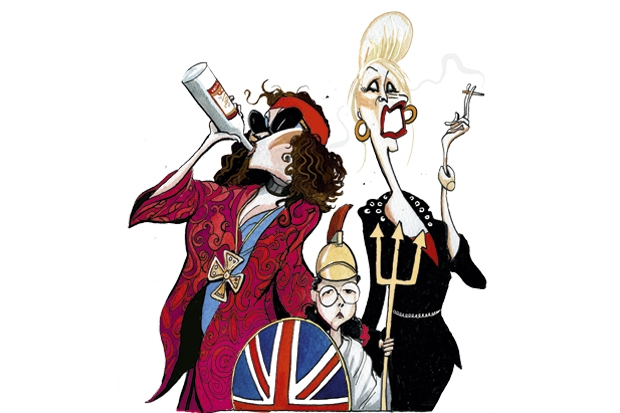Unseemly as the public blood-letting between stand-up comic Joshua Howie and his apparently less-than-absolutely-fabulous mother Lynne Franks undoubtedly is, it nonetheless sheds light on a powerful tension at the heart of many of the nation’s families. Because whatever you think about self-proclaimed ‘Golden parent’ Howie’s motivation for decrying his ‘awful parent’ mother (not very much if you ask me, but he does have a radio show to promote), a critical point remains at stake. Were Baby Boomers bad, selfish parents, as he claims, and are their successors better?
One thing everyone can agree on is that over the last forty years the position of children in society has changed dramatically. Four decades ago teachers could beat children with canes and with impunity – now we focus on ‘child-centred learning’. Away from the classroom and in the home, most of Europe has made it illegal for parents to smack their children. In the UK, the 2004 Children’s Act makes it illegal to smack yours except where it amounts to ‘reasonable punishment’.
Forty years ago children were barred from pubs. But head to a boozer at the weekend nowadays, and you’re likely to be mown down by a sugar-fuelled toddler – as his father looks beerily on – on their way to a dedicated children’s soft-play area. And not only has the status of children changed, but also what is expected of parents and parenthood has changed. It’s not just the classrooms that have become child-centred.
Forty years ago, mothers were advised to let their bottle-fed babies ‘scream it out’ at bedtime (‘Close the door, dear, pour yourself a gin and tonic and have a Rothmans’). Nowadays parenthood’s all about ‘feeding on demand’ and adjusting your day to suit your baby’s sleeping patterns. It’s ‘baby comes first’ not ‘mummy knows best’.
As Howie’s case illustrates, the 1980s was the era when the latchkey kid was born – thanks principally to the rise of the shoulder-padded career woman and also the single mother. These children were the subjects of an unparented social experiment; the first generation who were greeted by the television set rather than an adult when they got home from school. In the absence of the housewife, these children fended for themselves, unless there were relations to look after them, or if you were privileged, like Howie, nannies.
‘Mum was the epitome of the Eighties career woman; on the phone to the office within 20 minutes of my birth, she didn’t get off again until I was 16,’ Howie says of his PR guru mother, model for Jennifer Saunders’ Edina in Absolutely Fabulous. ‘And during that time, where more than 20 nannies raised me, I have not one recollection of Mum ever playing with me or reading me a bedtime story.’
When did parents start reading their kids bedtime stories, I wonder? It didn’t happen in my day; there was a quick prayer instead. Now, however, it’s something that parents do, apparently daily. Another post-Boomer innovation perhaps? Just yesterday I saw my wife reading a bedtime story to our son Herbie. So something has changed, and everyone, including Lynne Franks, now knows it.
Not long ago my mother took out her mobile phone – and duly punched in the four digit security number. It was 1910, which I happen to know is her mother’s birth year. On this impulse I checked my own phone and was required to tap in my own four-digit passcode: 2016 – my son’s birth year. Was it a coincidence, I wondered?
On reflection, I don’t think so: Baby Boomers were raised to march to the tune of the fifth commandment: ‘Honour thy father and thy mother.’ Generation X and the Millennials – those born from the mid-sixties onwards – walk to a different tempo, one more in tune with our more godless times. ‘Honour thy son and thy daughter,’ is their cultural commandment. The parents can stuff it.
For further proof look at the care homes filled to the brim with old people that none of their children want to look after. And that’s because children are no longer there to serve the interests of their parents, as they were for the post-Victorian Boomer age, and even more so for their parents before them. Now children exist for themselves, not as psychological extensions of their immediate progenitors. Instead today’s parents, willingly, have placed themselves at the service of their children and not (in the broadest sense) the other way around.
This is baffling for many Boomers who doubtless think their children have gone gaga crazy and put the cart before the horse. For them society’s elevation of children has gone far too far. And who knows where this will lead? Time will tell. The next lot will let us know how they feel about us by approximately 2045.






Comments